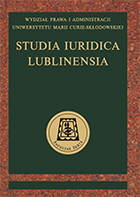Why is Analogy in the Empirical Science and Everyday Life Different from Analogy in Law?
Why is Analogy in the Empirical Science and Everyday Life Different from Analogy in Law?
Author(s): Maciej KoszowskiSubject(s): Education, Methodology and research technology, Philosophy of Law, Sociology of Law
Published by: Wydawnictwo Naukowe Uniwersytetu Marii Curie-Sklodowskiej
Keywords: analogy; law; differences; science; natural; empirical; life; everyday; daily; legal
Summary/Abstract: The article elucidates differences between analogy in law and the empirical science and everyday matters such as: a) the lack of possibility of verification of its conclusions on empirical grounds resulting in the necessity of its performing either heuristic and probative functions or rejecting both of them, b) being of a prescriptive nature, c) having an obligatory character, d) entailing rather no need for complex underling doctrines or theories, e) causing more serious practical consequences, f) having base points that are easily recognizable, g) serving as a means of extending authority, h) being a subject of training and education, i) receiving extraordinary attention among scholars, often combined with the real adoration – if not worship – on their part. The author is convinced that – by highlighting these differences – he will have demonstrated the uniqueness of legal analogy. However, simultaneously, he is far from contending that he knows how legal analogy really proceeds and how the judgment of similarity within it is precisely done. Instead, he assumes that if exact knowledge in these respects remains unattainable for human beings, it is all the better for legal philosophy and those who are devoted to it.
Journal: Studia Iuridica Lublinensia
- Issue Year: 25/2016
- Issue No: 2
- Page Range: 127-143
- Page Count: 17
- Language: English

